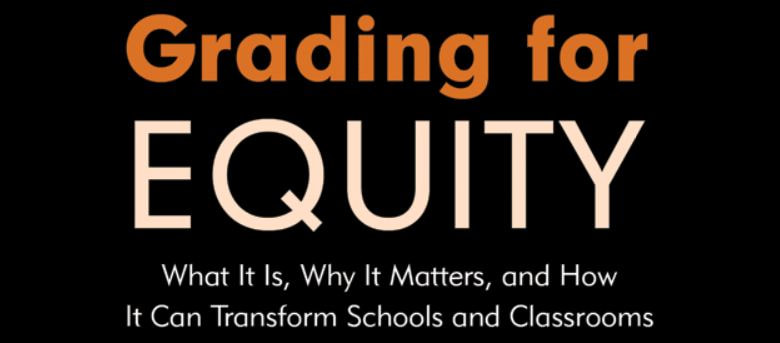I chose the image above because when I view it I feel calm, which is really what I need right now. Like other teachers I have a fair amount of anxiety about when and how to reopen schools safely during the current coronavirus pandemic. This post is not about that though; it's about another anxiety I have - how to equitably assess my students this school year. As my previous blog posts about Joe Feldman's Grading for Equity book have indicated, I need to make a change in my assessment of student work if I want to make it more equitable. And I do.
So after months of thought as well as conversations with my spouse (an English professor) and lots of amazing science teacher colleagues from the American Modeling Teacher's Association, I have a plan.
To make my assessment of students more accurate I've decided to stop using a traditional 0-100 scale, which is too granular and weighted toward failing scores. Instead I will use a much simpler 5 level scale. This 5 level scale has a minimum floor and avoids using zeroes which can really tank (sometimes irrevocably) a student's grade. I plan to only assess students individually, not as part of a small group, and my plan involves weighing more recent performance as a more accurate indication of a student's progress.
To make my assessment of students more bias-resistant I will only be using summative assessments and not formative ones like classwork, homework, labs, etc. While I will continue to give feedback and have conversations with students on this work, they will not factor into a student's grade (except that their efforts on their formative work will likely impact their performance on summative work). That means I will also not be penalizing students for late work or my perception of their participation or effort. There will be no extra-credit for students; instead students can request to reassess specific required content. If cheating occurs on a summative assessment, the student's grade will not be penalized for cheating, some other restorative practice will be employed, and the student will be required to reassess.
To make my assessment of students more motivational I will be using the minimum grading and simpler 5 level scale that I mentioned above. These practices help students maintain hope of productive improvement even after setbacks. I also plan on making reassessments mandatory. That means every week or two I'll set aside class-time for students to reassess one or more standards that they have yet to master. Reassessments are motivating to students and requiring them as part of the class is a bias-resistant practice. Finally, I'll be renaming my grades by using words and phrases that emphasize learning and growth rather than a reductive numerical score.
I have a reasonable amount of anxiety about how parents and students will react to this and also about the fact that I'll be the only teacher in my school doing this work (that I know of). I suspect I'll have lots of questions to answer before colleagues, parents, and students are comfortable with the system, but it's my belief that eventually they will be. I sorely wish I had done this work years ago, but my guilt for not trying this earlier will not be assuaged by just doing the same things I've always done. Most of the plans outlined above are big changes for me, but now that I know better, I must do better.
If you are interested in specifics, I created a document so that students and parents could see the details of my assessment plan and how I will eventually have to convert the standards based assessments into a traditional letter grade in Infinite Campus.
Standards Based Assessment in Mr. Bryant's Classes
I'd be happy to hear your feedback/suggestions.
[email protected]
So after months of thought as well as conversations with my spouse (an English professor) and lots of amazing science teacher colleagues from the American Modeling Teacher's Association, I have a plan.
To make my assessment of students more accurate I've decided to stop using a traditional 0-100 scale, which is too granular and weighted toward failing scores. Instead I will use a much simpler 5 level scale. This 5 level scale has a minimum floor and avoids using zeroes which can really tank (sometimes irrevocably) a student's grade. I plan to only assess students individually, not as part of a small group, and my plan involves weighing more recent performance as a more accurate indication of a student's progress.
To make my assessment of students more bias-resistant I will only be using summative assessments and not formative ones like classwork, homework, labs, etc. While I will continue to give feedback and have conversations with students on this work, they will not factor into a student's grade (except that their efforts on their formative work will likely impact their performance on summative work). That means I will also not be penalizing students for late work or my perception of their participation or effort. There will be no extra-credit for students; instead students can request to reassess specific required content. If cheating occurs on a summative assessment, the student's grade will not be penalized for cheating, some other restorative practice will be employed, and the student will be required to reassess.
To make my assessment of students more motivational I will be using the minimum grading and simpler 5 level scale that I mentioned above. These practices help students maintain hope of productive improvement even after setbacks. I also plan on making reassessments mandatory. That means every week or two I'll set aside class-time for students to reassess one or more standards that they have yet to master. Reassessments are motivating to students and requiring them as part of the class is a bias-resistant practice. Finally, I'll be renaming my grades by using words and phrases that emphasize learning and growth rather than a reductive numerical score.
I have a reasonable amount of anxiety about how parents and students will react to this and also about the fact that I'll be the only teacher in my school doing this work (that I know of). I suspect I'll have lots of questions to answer before colleagues, parents, and students are comfortable with the system, but it's my belief that eventually they will be. I sorely wish I had done this work years ago, but my guilt for not trying this earlier will not be assuaged by just doing the same things I've always done. Most of the plans outlined above are big changes for me, but now that I know better, I must do better.
If you are interested in specifics, I created a document so that students and parents could see the details of my assessment plan and how I will eventually have to convert the standards based assessments into a traditional letter grade in Infinite Campus.
Standards Based Assessment in Mr. Bryant's Classes
I'd be happy to hear your feedback/suggestions.
[email protected]





 RSS Feed
RSS Feed
